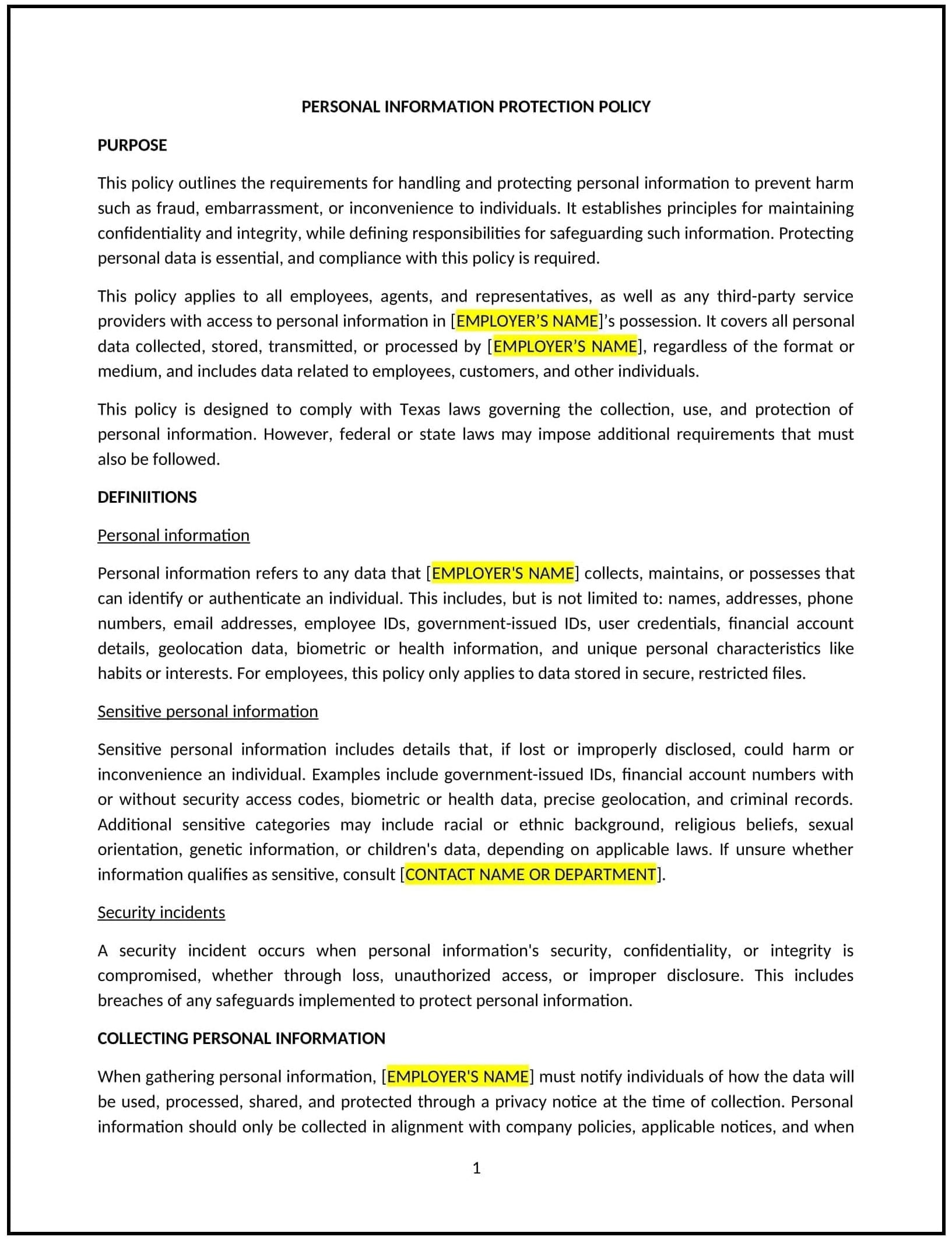Personal information protection policy (Texas): Free template
Got contracts to review? While you're here for policies, let Cobrief make contract review effortless—start your free review now.

Customize this template for free
Personal information protection policy (Texas)
This personal information protection policy is designed to help Texas businesses establish clear guidelines for protecting the personal information of employees, customers, and other stakeholders. The policy outlines how personal data should be collected, stored, used, and shared, promoting compliance with Texas state laws, federal regulations, and industry best practices related to data privacy and protection.
By adopting this policy, businesses can protect sensitive personal information, reduce the risk of data breaches, and promote trust with stakeholders by demonstrating a commitment to privacy and security.
How to use this personal information protection policy (Texas)
- Define personal information: Clearly define what constitutes personal information, including any data that can identify an individual, such as names, addresses, phone numbers, email addresses, social security numbers, and financial data.
- Specify data collection practices: Outline how personal information will be collected, including the methods of collection (e.g., forms, surveys, online transactions), and ensure that data is collected only for legitimate business purposes.
- Set guidelines for data storage: Define how personal information should be stored, including encryption methods, access controls, and storage duration. Specify how data will be protected from unauthorized access, theft, or loss.
- Address data sharing and third-party access: Provide clear guidelines for sharing personal information with third parties, including vendors, contractors, or other business partners. Ensure that third parties comply with the company’s data protection standards.
- Implement access controls: Specify who within the company has access to personal information and how access is granted, monitored, and revoked. Implement role-based access controls to limit access to sensitive data.
- Establish data retention policies: Define how long personal information will be retained and when it will be securely disposed of. Ensure that personal data is not kept longer than necessary for business purposes or legal requirements.
- Address data security breaches: Specify the procedures for responding to data breaches, including how breaches will be reported, investigated, and mitigated. The policy should outline the company’s notification obligations to affected individuals and regulatory authorities.
- Promote employee awareness and training: Ensure that employees understand their role in protecting personal information, including how to handle and dispose of data securely. Provide regular training on data privacy and security best practices.
Benefits of using this personal information protection policy (Texas)
This policy offers several benefits for Texas businesses:
- Protects personal data: By defining how personal information should be handled, the policy helps businesses protect sensitive data from unauthorized access, loss, or misuse.
- Enhances legal compliance: The policy helps businesses comply with Texas state laws, federal regulations (such as the Privacy Act, CCPA, or GDPR), and industry-specific data protection standards, reducing the risk of legal penalties or liability.
- Builds trust with stakeholders: By demonstrating a commitment to protecting personal information, businesses can build trust with employees, customers, and other stakeholders, enhancing their reputation and encouraging loyalty.
- Reduces the risk of data breaches: A structured approach to data protection reduces the likelihood of data breaches, which can lead to financial loss, reputational damage, and legal consequences.
- Supports business continuity: By implementing secure data storage and retention practices, businesses can ensure that personal information is protected even in the event of system failures or cyberattacks, supporting overall business continuity.
Tips for using this personal information protection policy (Texas)
- Communicate the policy clearly: Ensure that all employees are aware of the policy and understand their role in protecting personal information. This can be done through training sessions or included in the employee handbook.
- Regularly review data security measures: Periodically assess and update data security measures, such as encryption, access controls, and monitoring systems, to ensure that they remain effective in protecting personal information.
- Implement data minimization practices: Ensure that personal information is only collected, used, and stored to the extent necessary for business purposes. Avoid collecting unnecessary or excessive data.
- Monitor third-party compliance: Regularly review contracts and data-sharing agreements with third parties to ensure they are compliant with the company’s data protection standards.
- Conduct regular audits: Perform regular audits of data protection practices, including data storage, access controls, and incident response procedures, to identify potential vulnerabilities and areas for improvement.